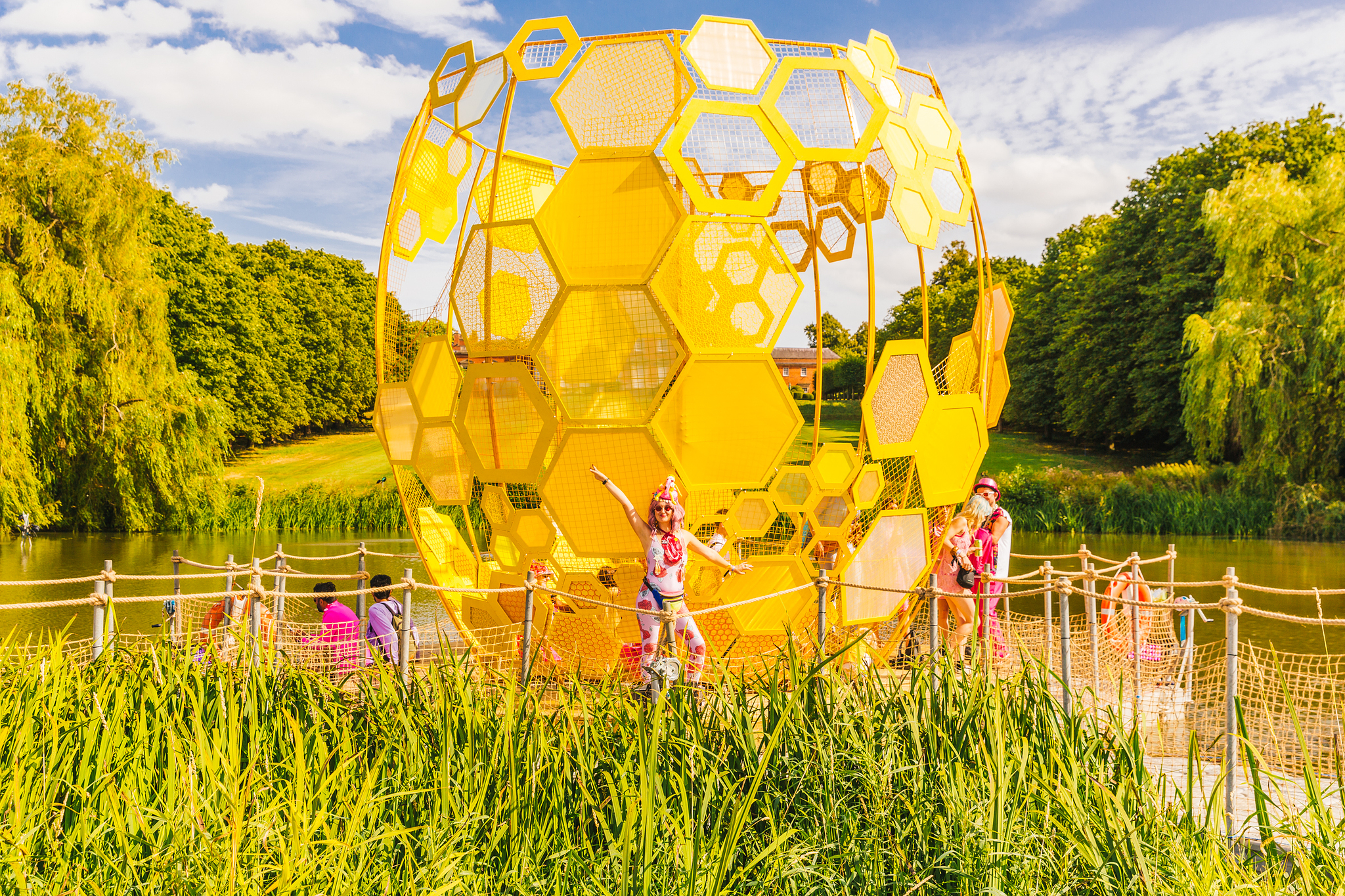We’ve been rather busy at Shambala HQ, crunching, measuring & analysing our environmental and community impacts, in gloriously nerdy detail. Let’s deep dive into what we achieved together in 2024.
A huge thank you to every single person (audience, crew, artists, suppliers and the rest) who contributed to this years’ adventure in utopia!
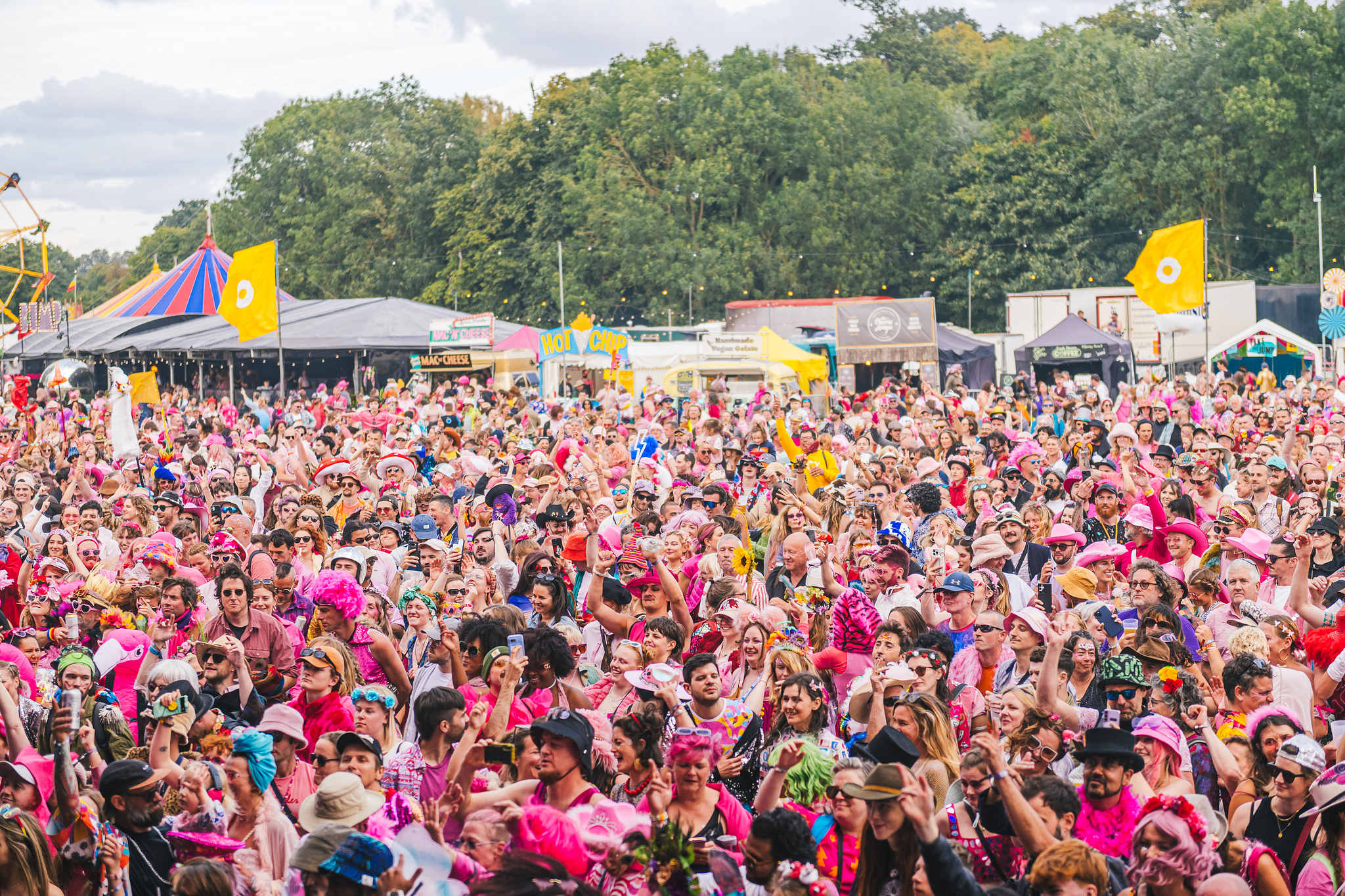
THIS YEAR’S HIGHLIGHTS
- £147,758 raised for community & environment in 2024!
- Over a third of Shambalans arrived on coach and rail using our eco travel options
- Our food traders served up seriously low carbon meals – on average, 0.45kg C02 per plate, vs the UK average of 2kg C02 per plate!
- You legends used our campsite caddies to collect nearly 10 tonnes of food waste, which we sent to compost!
- Nearly two thirds of our tents and structures come from within 100 miles of our festival site.
- The grub served in our crew canteen was 47% organic…
- …and 75% of our crew food was sourced from within 200 miles of Shambala – from just 15 farms!
- This year, we provided coaches for our crew, from key cities
- We served pioneering crew food with 47% organic produce, and 75% came from within 200 miles across 15 farms.
- We got forensic about recycling – even sorting 2 tonnes of general waste, on site, by hand.
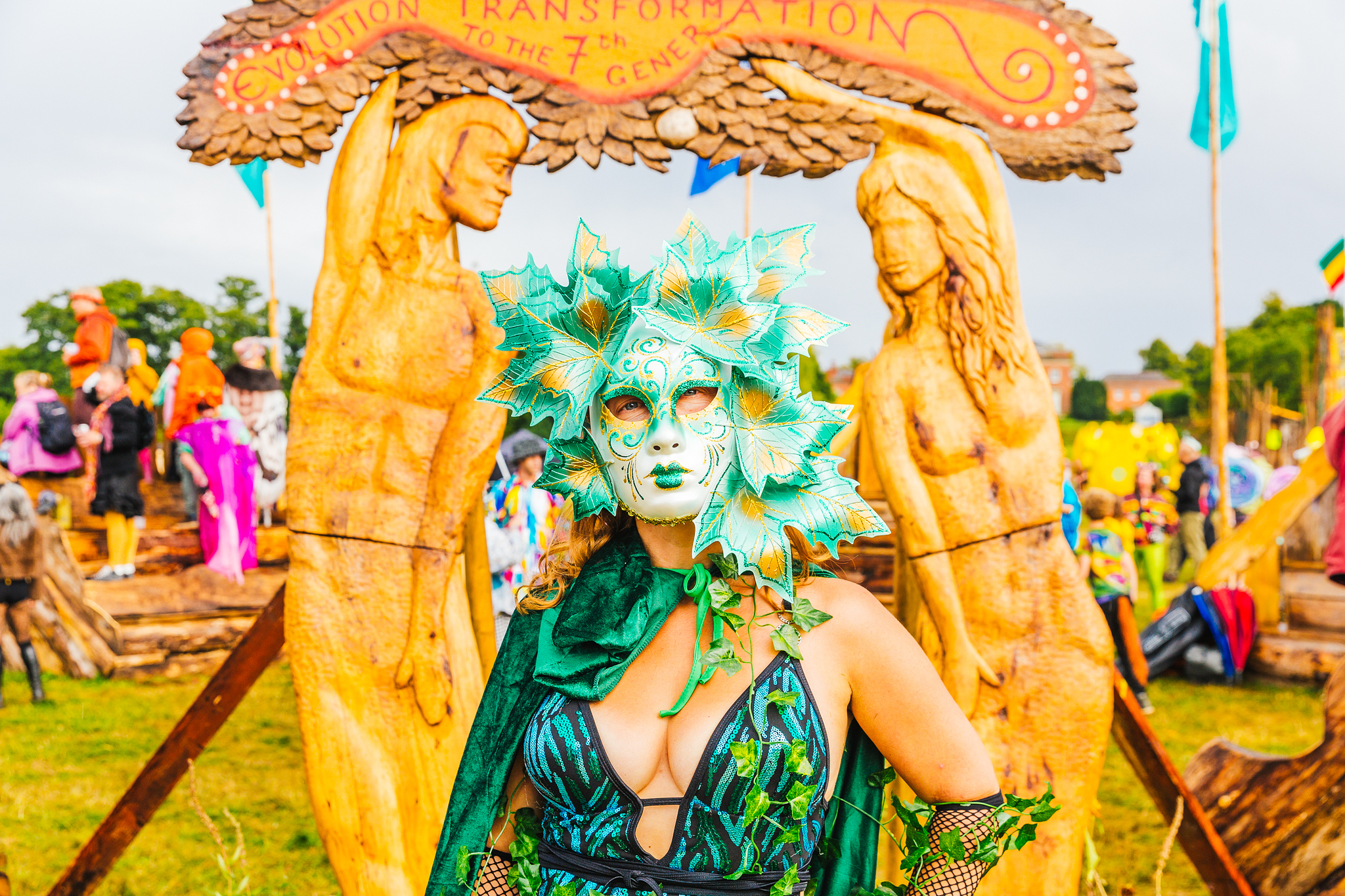
S U S T A I N A B I L I T Y
SHAMBALA’S GREEN STORY SO FAR
We’ve come a long way since the early days of Shambala, back when we were just 100 mates, having it in a field! Over the last quarter century, with your help, we’ve achieved a lot, to become one of the most sustainable, and environmentally pioneering festivals out there. Here’s a look back at our journey over the last 25 years, in our quest for ‘purposeful hedonism’ (aka keeping the party going forever)
1999

2001

2002

2004

2007

2008

2009

2010
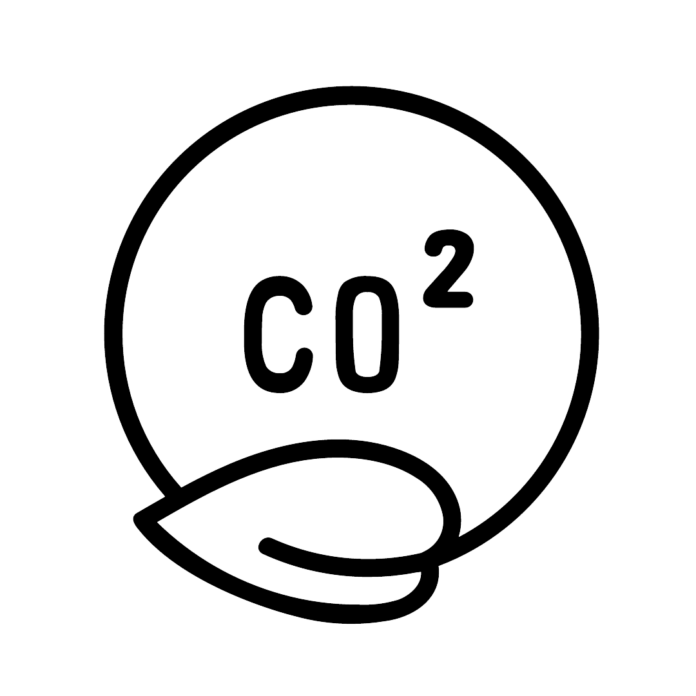
2011

2012

2013

2014

2014

2015

2016

2017

2017

2018

2019

2020 (no festival!)

2021 (Shambino)

2022
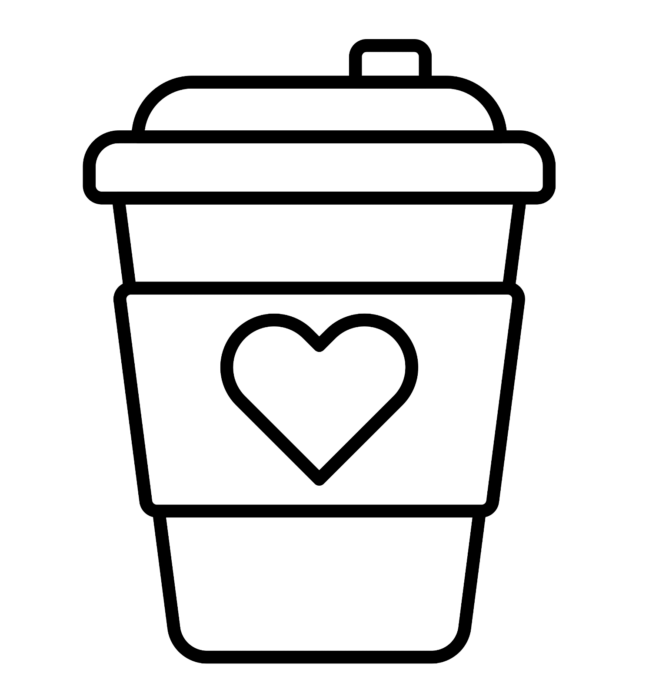
2023

2023


Carbon Footprint
Our total carbon footprint has dropped since last year. HURRAY! However, this is a double edged sword, because we did have slightly less people on site this year.
(this is why we measure our statistics on a per-person, per-day basis, as it’s more informative – and gives us a way to compare like for like)
2023
2024
* CO2e* means the “carbon dioxide equivalent”. It’s a term for accumulating different greenhouse gases into a common unit, and compares the global warming potential of these gases by converting all associated emissions into the equivalent warming of carbon dioxide.

Carbon Footprint Per Person Per Day:
As we said, our total footprint (above) is a useful metric, but how does this relate to each of us as individuals? Below is the amount of CO2 equivalent for each person who attended the festival as audience members, crew, artists or suppliers.
It’s almost the same as last year. But of course we’d quite like it to decrease. We’re making plans to hammer it down further, in 2025…

Travel
Travel is always the biggest chunk of emissions for any event, often contributing 50-80% of the total CO2e.
Persuading people to get out of their cars and onto coaches and trains isn’t without it’s challenges. We get it, there’s a lot of comfort and convenience that comes with travelling in a private vehicle. Unfortunately, there’s an awful lot of emissions that come with it, too.
Despite all that though, in 2024 one third of Shambalans still took public transport instead of driving!! This saved us 136 tonnes of CO2e. The private transport of our audience members generated 340 tonnes CO2e, crew accrued 99 tonnes CO2e, artists accumulated 30 tonnes CO2e, and our suppliers supplied 113 tonnes CO2.
We try our best with this behind the scenes, bringing 55% of our big tent infrastructure (think the Solasta rigging, or the Phantom Laundry big top) from within 100 miles! And we get all our big, heavy machinery including cherry pickers and telehandlers from just 5 miles away.

Energy
As you probably know (we’ve mentioned it a few times…) we power Shambala without any fossil fuels. We use renewable biofuels in our carefully tailored, ultra-efficient generators, we have a grid connection using totally-green ethical tariffs and we use some small but powerful batteries charged from the mains, for smaller activities.
]We’ve trialled everything over the years! Solar power, small wind turbines, wood, even human-leg-power! We even started a company with other festivals back in the day called Powerful Thinking to help explore new ways to reduce the industry’s impact. But given the size and scale of our stages – we have had to use bio-fuel as we’ve grown. That said, some of our food traders use only solar power! Check out our winner of our Sustainable Food Trader 2024 award this year for a cracking example of this.

Waste
SO… the bad news (and the even worse news) is: we produced half a tonne more waste this year, and recycled 5% less waste!? We’ve been unable to improve on our recycling rate for some years now and we’ve hit a really annoying plateau. If you have any ideas to improve things, please get in touch.
Our waste contractors are heroes (hiya Greenbox, we love you). They are the most dedicated and experienced crew. This year, they did an incredible job offering an industry-standard, deep-dive, hand-sort audit on 2 tonnes of our General waste – to learn where our community is slipping up. We found that people were binning, rather than recycling, the following items:
- LOADS of drinks cans, and food cans too. They can all go in recycling.
- Quite a lot of plastic bottles! (We haven’t sold these at Shambala for well over a decade, so these are bottles that have been brought to site, rather than bought on site). As only about 9% of plastic bottles get recycled globally, it’s really important to put them in the right bin.
- Food waste – this gets composted with serveware, so please keep it out of general waste.
We produced 90 tonnes of waste in 2024. Almost the weight of a blue whale.
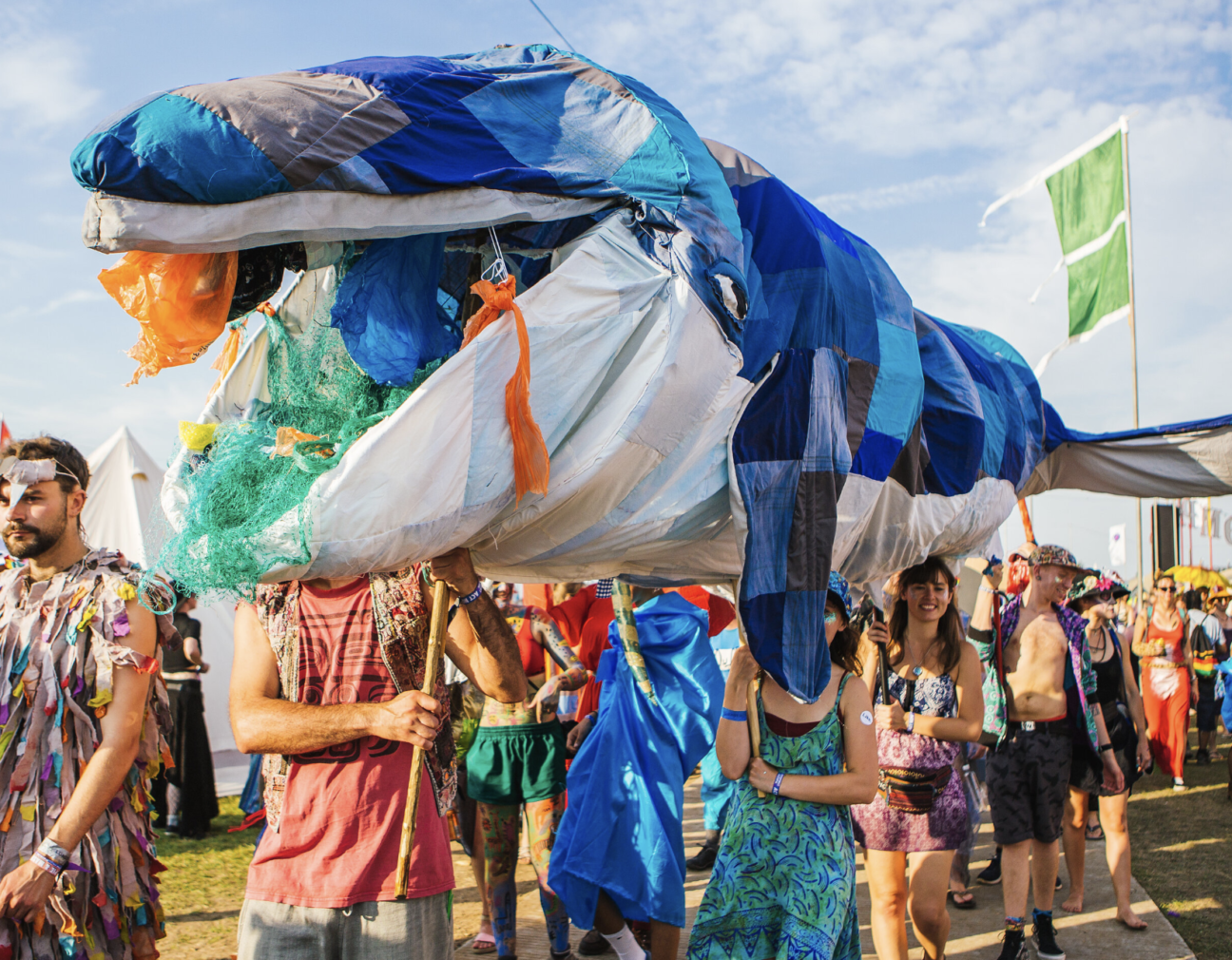
We, like the rest of the world, are really struggling to reduce our waste and improve our recycling rates…..
Like any society, city, or settlement – we’re only as strong as our people.
So it really does take all hands on deck, separating waste carefully together to create a circular system for our materials and waste.
So for 2025 our request is for everybody to get more pernickety with the bins bags and caddies you pop your waste in. We’ll be publishing a recycling guide soon to help you do this.
Our waste per person increased slightly this year. We do make a point of being chilled out when it comes to not stopping people bringing in their own booze and food (we’ll never be one of those events that searches you for sandwiches on the way into the arena to maximise our £££) but unsurprisingly, the more pre-packaged food you bring along, the more packaging we have to deal with afterwards.
We’re trying hard to give you more options for wholefoods and plastic free snacks, with this in mind. Did you know we have fruit & veg wholesaler (and zero-waste scoop store) at Shambala? Find it near Heatwave Sauna. Good, local, fair-priced, fair-trade goods, without the plastic.

Materials
We’ve been accounting for all of our build materials for a couple of years now….literally down to the last screw. This year, we reduced our material consumption considerably, primarily in hardwood used for construction – thanks to our ability to store and reuse materials in our onsite barn. This helps us reduce our materials-related emissions by 30 tonnes!

Meat Fish and Dairy
We’re one of a surprisingly small number of festivals that doesn’t have meat and fish on the menus – since 2016. Each year, this change saves us approximately 100 tonnes of greenhouse gas emissions from the festival’s carbon footprint. Yep, it’s that simple!
Our food systems are responsible for one third of global greenhouse gas emissions – and the world’s five biggest livestock-based producers actually emit more emissions than the largest oil and gas giants.
Dairy is also part of the gargantuan, green-house-gas-heavy livestock industry, and so we removed cow’s milk from our hot drinks back in 2019.
In 2024, our local, family-run oat farm (Wild & Furrow) sent us 7,000 litres of oat milk in glass bottles (and large reusable drums for Traders) to help us avoid unnecessary waste.

Food
Since going meat and fish free in 2019 – our food footprint plummeted. Now, food accounts for only 6% of our total emissions. The festival industry average is 34%!
So you’re helping us be way ahead of the curve with your predominantly plant-based food choices at Shambala.
Did you know:
- We use only oat milk in our beverages, festival-wide! Because it can be grown locally, right here in the UK, uses the least amount of water and produces the least amount of CO2. See more of our thinking here.
- The 7,000 litres of oat milk we consume at Shambala is grown and processed just 8 miles up the road, and delivered in glass bottles or refillable containers.
- All our eggs on site are from a farm 2 miles up the road, and all are actually free-range (don’t trust any supermarket “free-range” or “happy” eggs, aim for organic).
- 20% of produce used by Food Traders was organic!
- We logged all our Trader meals and crew catering on Klimato – a software for measuring CO2e of food.
- Our food footprint was 52 tonnes CO2e this year, a reduction on 54 tonnes last year.
Crew Catering
Our Crew Catering (Henry’s Beard) are bloody brilliant. They’re always up for helping us pilot various ideas and schemes in the crew canteen, to help us figure out if it would work on a bigger scale, with our audience. Here are just some of the amazing feats they pulled off with our crew food this year (whilst still serving up proper filling, delicious, healthy portions).
- 47% of all produce was organic.
- 13% was from regenerative farms.
- 75% came from within 200 miles.
- All fresh, seasonal produce came from 15 amazing, local farms.
- We substituted lots of far-away, high-impact ingredients (like rice) for UK grains.
- It took 8 crew members 2 hours to peel all the fresh, giant, organic garlic. And many, many more hours to soak, de-stone and process all the grains and “chick–peas” which we substituted into our recipes this year (SORRY AND THANKS) – all of which were grown in the UK by Hodmedod’s, and delivered in paper bags.
Big shout out to Connie (the woman, the myth, the legend) and her crew, who have been feeding us since 2013 and have trailblazed loads of sustainable solutions.

Drink
Our friends and bar providers (Refresh West) have been with us since day dot, and have helped us shape the most sustainable bars around, year on year. Of course, reusable bar cups are a must and soft drinks are on tap instead of in plastic – these things save us untold TONNES of plastic waste.
But did you know….?
- All our bar drinks are sourced from within 200km
- We’re fiercely independent and avoid globalised brands, supporting 12 local craft brewers instead.
- On top of that 80% of our wine, and 92% of our beer is vegan.
- We’re working on more organic drinks too….
Focus Areas & Actions:
We released our 3 Year Green Road Map in 2022. We set ambitious and trail-blazing goals across our governance, energy use, material management, food and drink and our transport options, and we’re looking deep into supply chains and the communities involved.

Carbon footprint
Source biogas for cooking – not easy!
Remain net positive through climate investment (scope 1).
Encourage more people to arrive on public transport (including crew and artists).
Understand and audit our full supply chain and company practices.

Circular economy
Design out new materials from the festival build.
Measure the impact of our build including infrastructure and transportation.
Increase recycling rates through community campaigns and innovation.

Regenerative food
Explore the possibility of a delicious, totally plant-based menu.
Ensure all meals are under the One Planet Plate 0.5 kg CO2e limit.
Work with local, small-scale regenerative farms.
Source the majority of food and drink from within 200km of the festival.
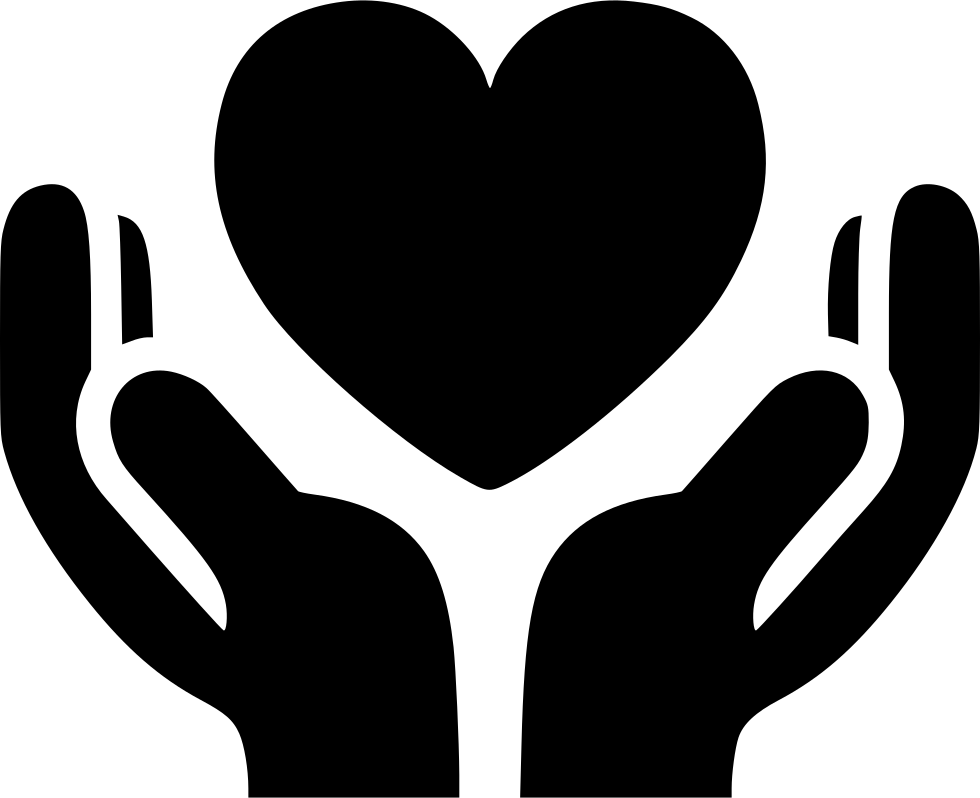
Positive influence
Influence everyone in our community and beyond; audiences, artists, crew, food traders and suppliers, to take actions to make conscious choices for their businesses or art, to map their impact, and to create targets for improvement. This year we’re working with several organisations to develop a sustainable suite of documents to encourage everyone to focus in on Environment Policies, Net Zero Strategies, Procurement Guides and Carbon Balancing schemes.
What can you, our Shambala community, do?
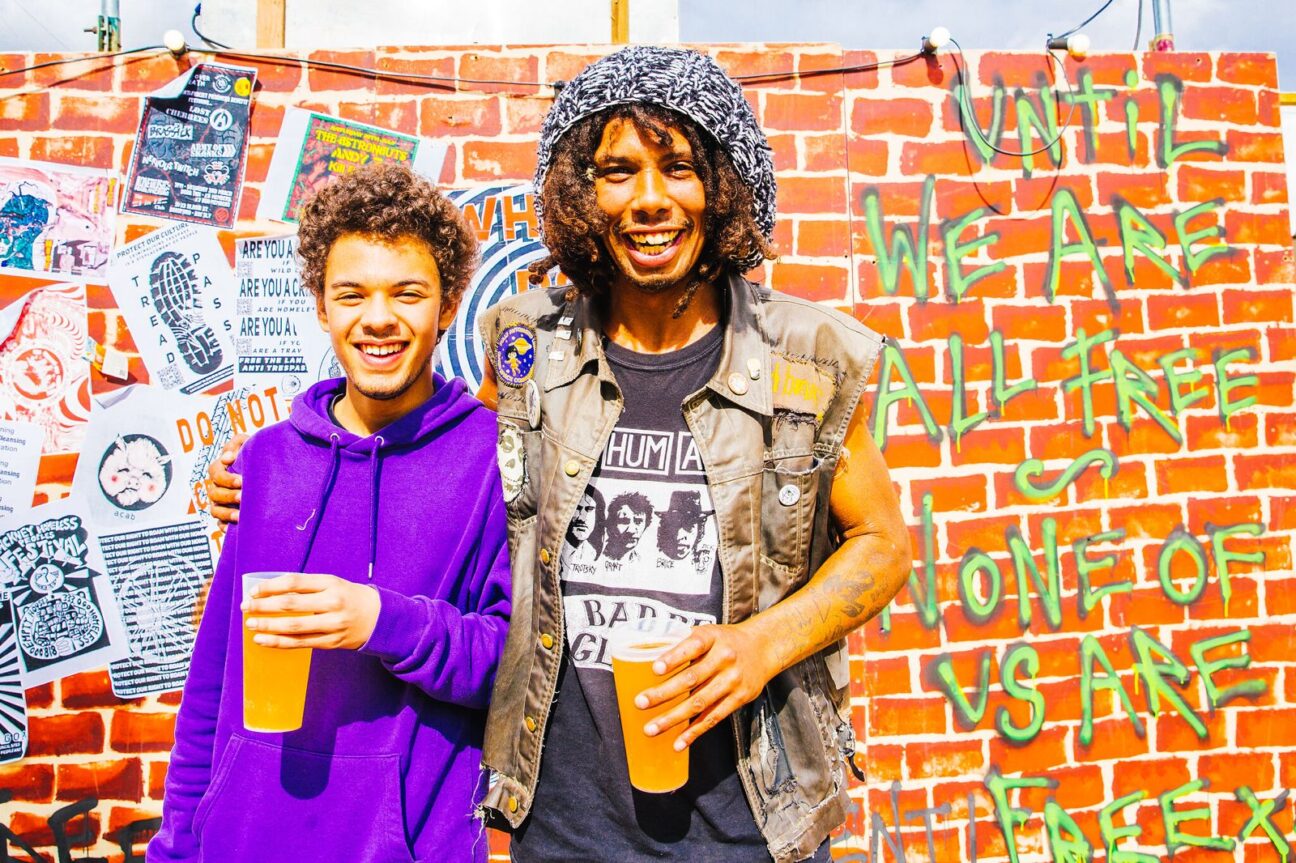
Battle disposable culture
When you’re on site with us, it would be BEYOND helpful, if you could:
- Avoid bringing too much plastic – wrapped snacks, bread and fruit which are often left behind and can contaminate general waste.
- Avoid disposable vapes – they get everywhere, they can’t be recycled and they’re super environmentally damaging..
- Check out our on-site, zero-waste van which offers delicious treats, or our on-site bakery or fruit & veg store which has all the fresh produce you’d want every day.
- Bring your own bits – bring a lunchbox and cutlery set, for your delicious meals from our amazing plant-based traders. There’s plenty of water on site to rinse and repeat!
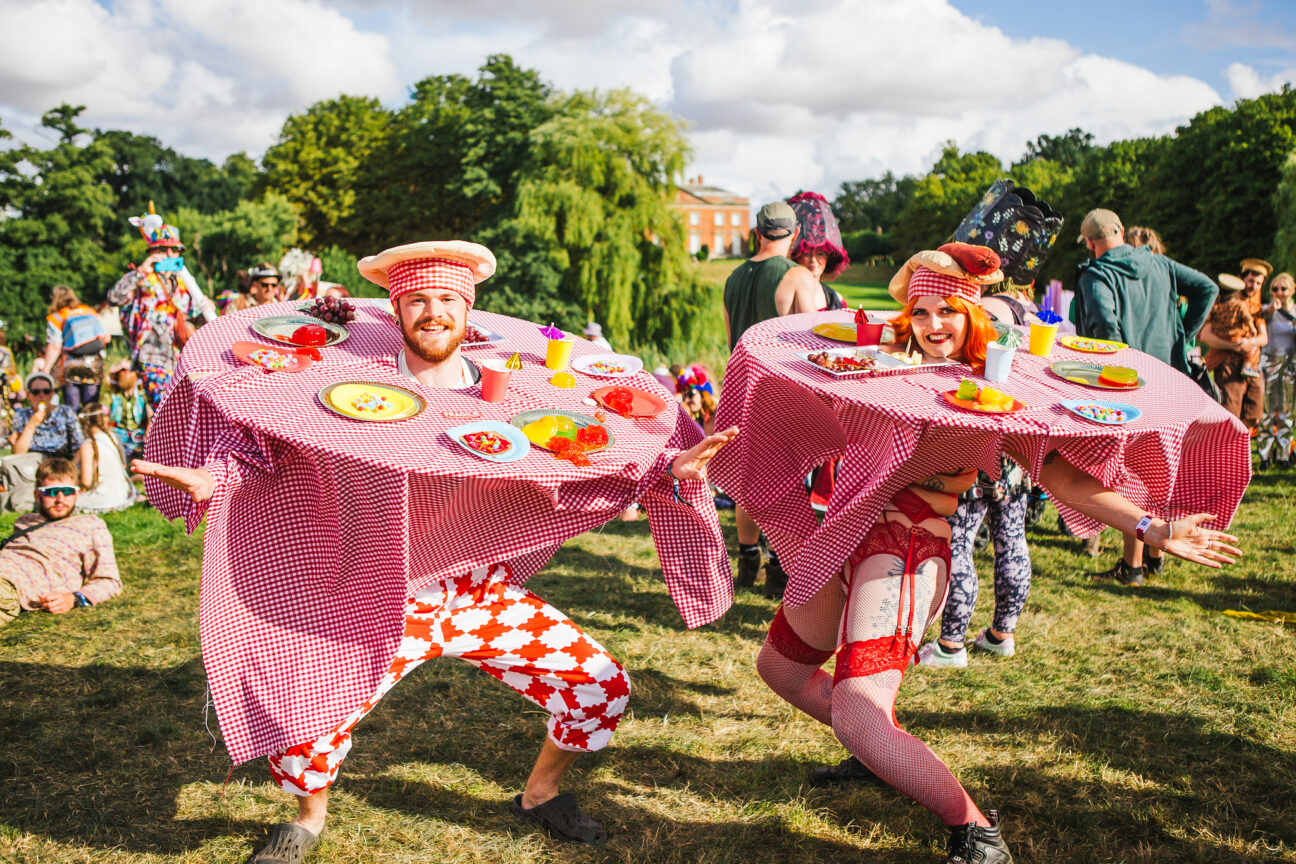
Waste
On site, contribute to the community and improve how we handle our waste:
- Grab a compost caddy from our Campsite Hubs to collect food waste – DON’T put food waste in the general waste bags.
- This way, we can turn your food waste into compost and put the energy back into the land.
- Separate recycling out carefully. Our audit showed there are still lots of mishaps happening, leading to less recycling!
- Collect up soft, flexible (scrunchable) plastics and return them to the supermarket. Show them we mean business on plastic-action!
- Aim to clean your recycling to avoid contamination. Empty your bottles of liquid properly, an give your yogurt of hummus pots a quick rinse..
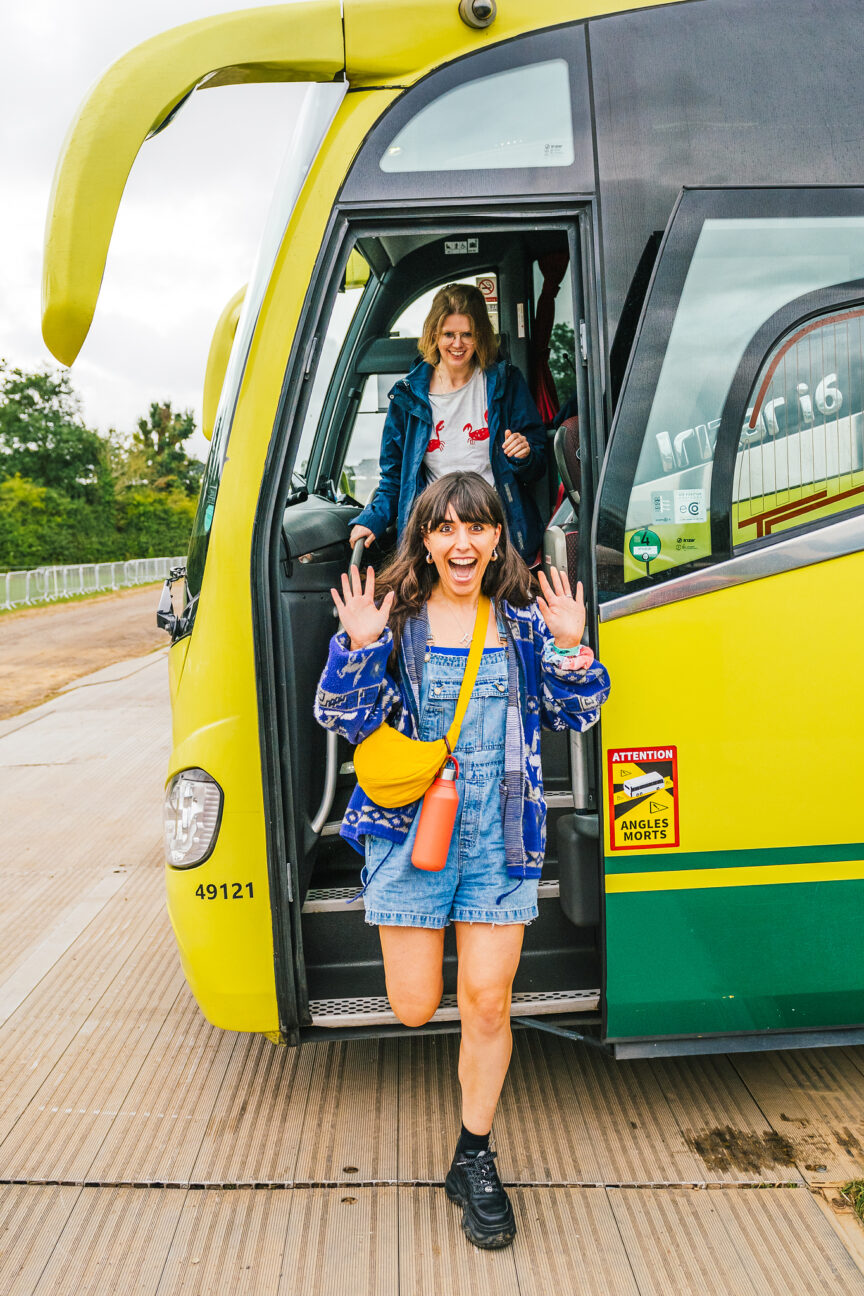
Travel and transport
To help reduce one of the world’s largest sectors for emissions:
- Choose public transport – Our coach and rail options make this REALLY easy (plus they’re £50 cheaper than generally entry. Yes, we will literally bribe you to get the coach or train).
- Pack light, and prepare to squeeze into vehicles – Aiming for 4-5 people per car would be incredible. Make a stop or two to stretch those legs!
- Let us know if there’s anything holding you back, or any ideas you have to improve on travel emissions. The world of 2050 will have far less private transport, so we’ve all got to get our thinking hats on!
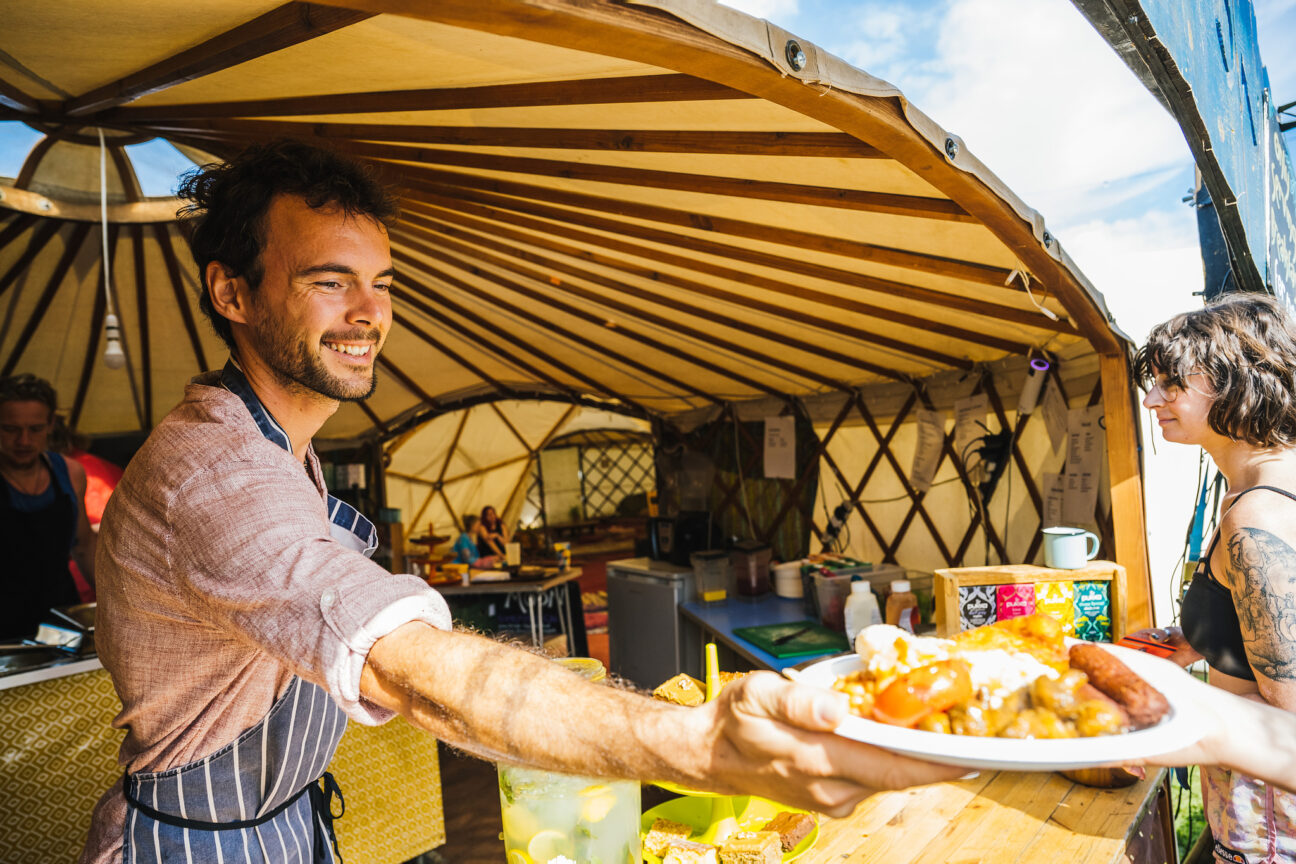
Food
How you can help improve on food related emissions:
- Consider your cuisine: Our meals are already quite low impact, and we’re working on reducing the higher-impact ones by substituting dairy or far-flung items like rice where we can. Think local, and seasonable as you shop.
- Less meat and dairy: unequivocally, these animals require a lot of space, food, air, and everything else – vegetables are way less intensive.
- Normal life: Thinking like this at home help ripple the impacts of our food focus out into the world.
- Focus on: plant-based, local and seasonal produce to help reduce humans’ reliance on far-away, exotic ingredients and bring more low-carbon, community produce into our local areas.
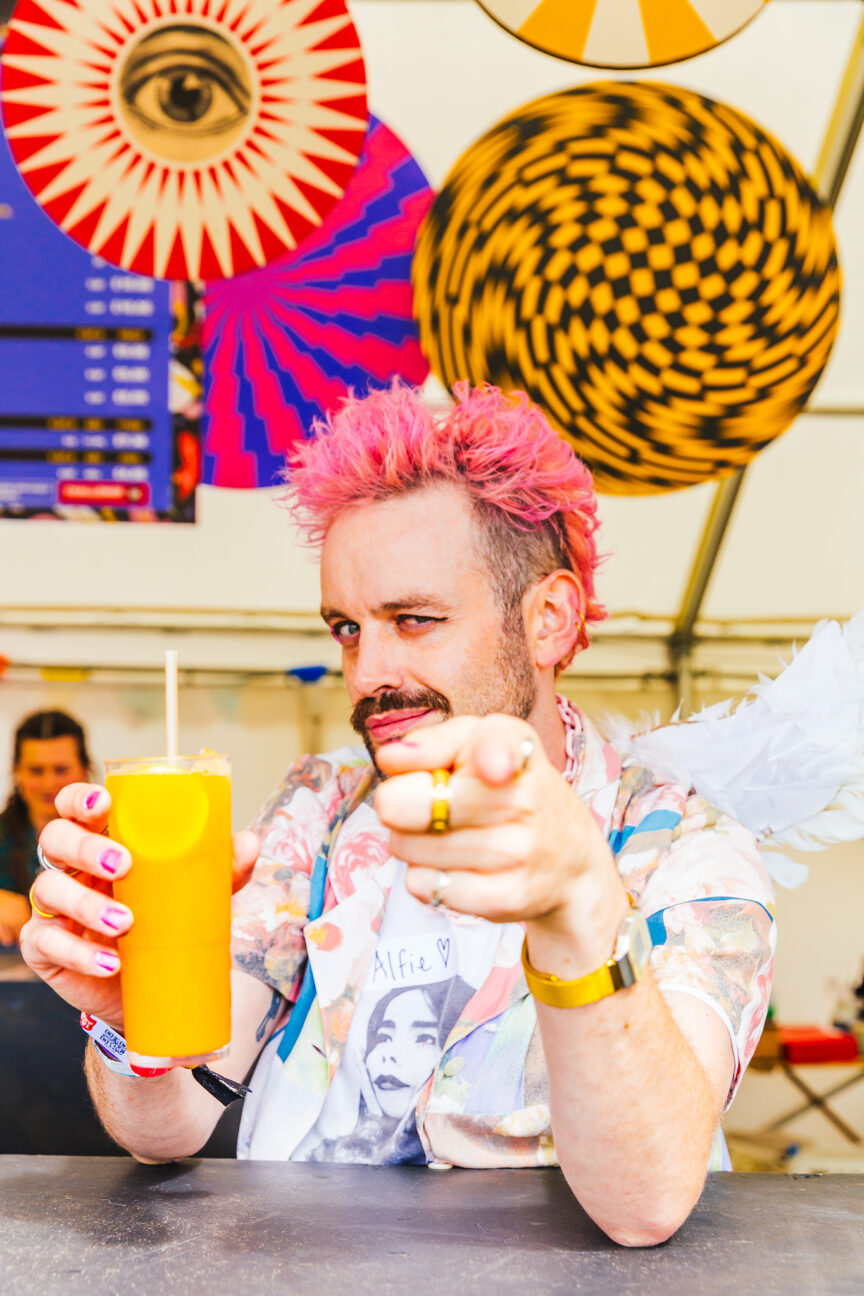
Drinks
How you can help improve our drink related impact:
- Please return the cups! They are made of plastic, and if they are not reused they are more carbon-intensive, and polluting that thin single use ones.
- We don’t brand them anymore to make them less appealing to be kept. They don’t belong to us and are used at heaps of other events.
- Drop them in CUP bins in the Arena or at the Cup Amnesty points on the way out.. just please don’t take them away as they need to be returned.
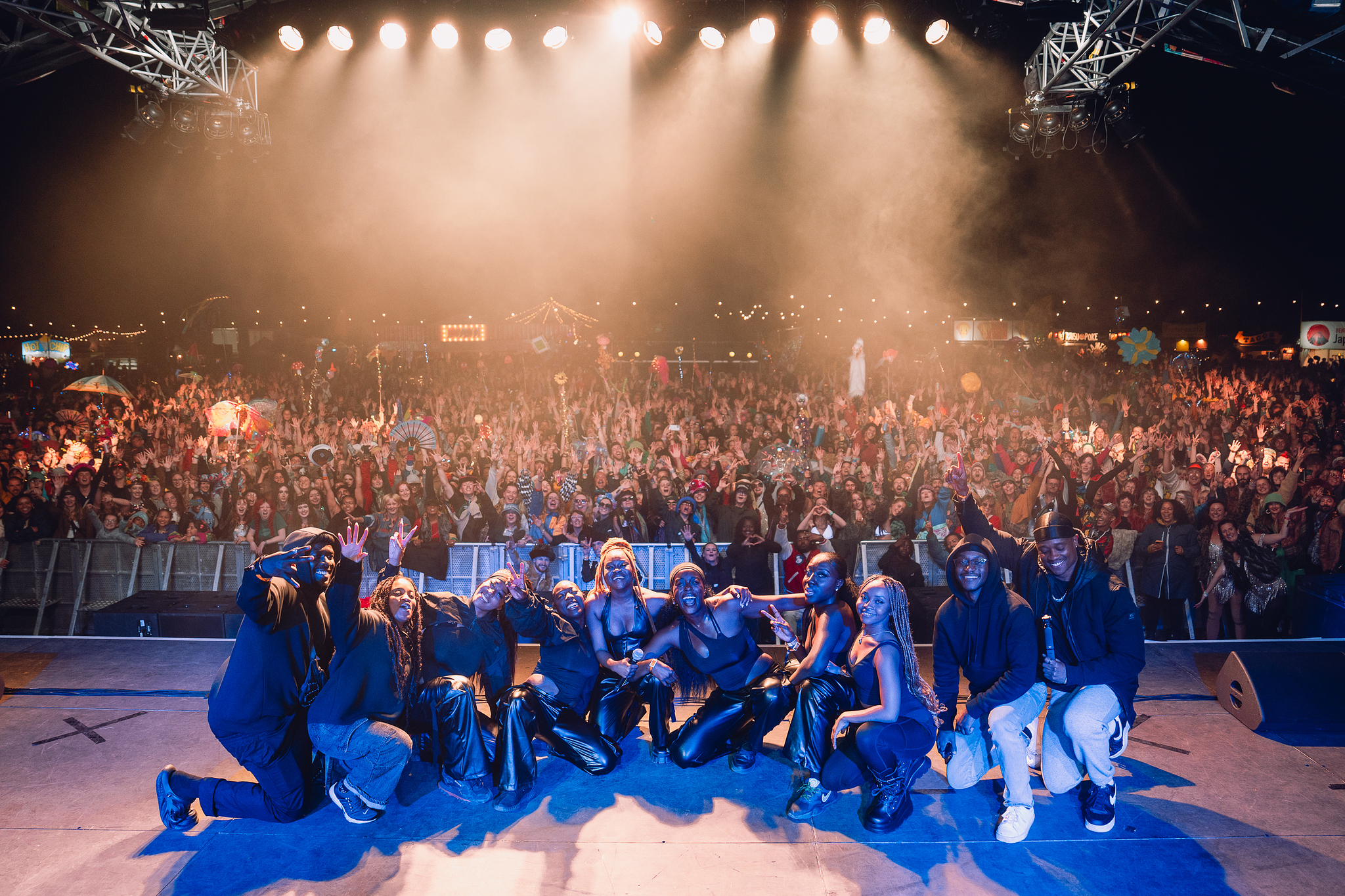
S O C I E T Y
We strongly believe festivals like Shambala should make a positive difference to society (as well as being a cracking party).
Festivals should be a place to strengthen community bonds, and provide transformative emotional benefits to improve lives. But it isn’t a party, unless it’s a party that welcomes everyone!

Gender representation on our stages
We want to achieve a true representation across our line ups and activities. In 2024, the ratio of artists/bands on our 3 main stages with female and non-binary members was as follows:
- The Shambala Stage: 63%
- Solasta: 46%
- Sankofas: 52%
As an overall average, 45% of the acts on our line up were fronted by women or non-binary folk (though in 2023, it was 54%)

Accessibility
Our accessibility applications have increased by 80% since 2022, due to the industry-leading measures we’ve taken. The following initiatives and services help support our disabled, neurodivergent and d/Deaf festival goers:
- Our dedicated Accessible Camping Area hosts nearly 500 people, with all buggies and equipment to make it a safe and comfortable stay on site.
- There are viewing platforms and areas on 14 stages with lowered bars across site, and queue jumps too, for those who need them.
- We have a British Sign Language interpreter service for those who’d like it.
- There are sensory spaces in the main arena, Kids Area and the Woodland Tribe, for a quiet, calm pit stop when the need arises.
- This year Attitude is Everything offered a review of all our services, and highlighted more improvements we could make for 2025.

Community Impact
- With your support and generosity, and through Shambala’s initiatives and charity partners, a record breaking £147,758 was donated to environmental and community causes through the festival this year.
- Pay It Forward: Share The Love. Since 2022, we’ve been running our Pay It Forward scheme – which raises funds to create full festival experiences (including tickets, travel, camping equipment, food and drink) for folks on low incomes who would not be able to experience Shambala otherwise. Donations can be made at the festival bars, whilst buying your tickets on our ticket page, or through our dedicated Pay It Forward PayPal account, here. In 2024, a record breaking £16,896 was raised for this initiative – meaning we can welcome even more people than ever on Pay It Forward tickets in 2025. THANK YOU.
- £13,895 raised for Medical Aid For Palestinians! Every year, we invite our community to sponsor the strings of prayer flags that adorn our main stage, for a different cause or campaign. This year, we chose Medical Aid for Palestinians. Our incredible audience rallied behind this cause, in a dazzling display of unity and support – making this by far the most successful ‘Flags For…’ campaign in Shambala’s history, and more than doubling our initial target of £6,000. Read more about this campaign and it’s impacts, here.
- 100% of our audience’s car and camper travel emissions were balanced with On:Board Earth, in community-benefit environmental restoration projects.
- Rebel Soul (a deeply inspiring activist hub/venue at Shambala) ran it’s incredible café, raising much needed funds for a wide variety of grassroots campaigns and activist causes.
- Over 600 incredible Oxfam stewards donated their time to raise money to fight poverty and provide disaster relief in worldwide projects.
- Our MyCause volunteers donated their time to raise funds for their chosen charities, including MIND, Medical Aid for Palestinians, National Autistic Society, Psycare UK and Birmingham Dogs Home.
- Our roving merchandise teams on site raised much needed funds for Bansang Hospital in Gambia, by selling our paper programmes!
- All profits from our secure storage/locker hire on site go directly to the Campaign for Nuclear Disarmament
- Our phone charging stalls on site raise money for Temwa – an incredible charity who work to end poverty and build climate resilience in rural, Northern Malawi.
- Donations from the sale of our Shambala reusable steel bottles go to Raw Foundation, in their fight against pointless plastic waste. Buy yours here!
- Our friends at Love Support Unite raised much needed funds for sustainable farming programmes in Malawi, through the sale of Love Specs – with every pair of specs purchased cleaning up 2.5kg of ocean bound plastic!
- Nosh Community Café serves up delicious food on site at Shambala, whilst raising funds for community projects in the villages surrounding our site – Great Oxendon, Clipston and Arthingworth. In 2024, a whopping £21,000 was raised for these local communities.
- WaterAid provided some lush toilets for us this year and raised money to provide people across the world with clean water, decent loos and good hygiene.
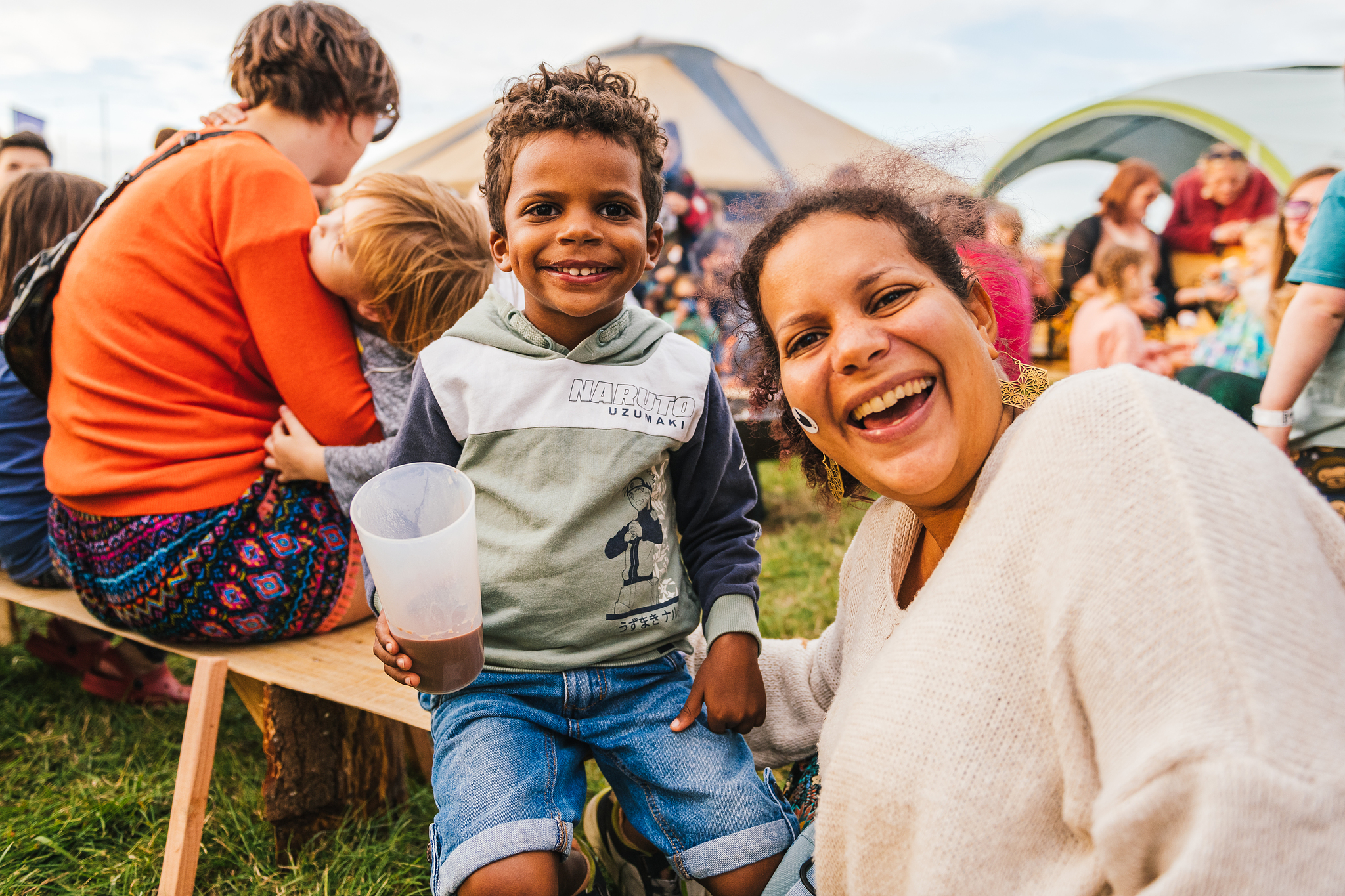
The future…
We have reduced the festival’s footprint drastically over the past decade: achieved 100% renewable electricity onsite, become meat and fish free, eradicated single use plastics and encouraged over a third of audience members to come in public transport. But there is always more to learn and do!
This is the final year of our ambitious 3 Year Green Road Map which kicked off in 2022. After 2025, we’ll review these commitments and set our sails for the next set of targets.
We’ve been learning how to combat social, racial, and climate injustice, how we can use our platform to address the root causes of climate change and avoid bringing colonial patterns from the present to the future. We’re nearly ready to release our much anticipated, and carefully curated (and heavily tested) Climate Justice manifesto – and to open a discussion on how this will impact our offering.
Thanks to each and every one of you who has contributed to this incredibly wonderful and fluffy community of Shambalan’s that have made us one of the most sustainable festivals in the world!
Find out more about what we’re doing on the website here: Green Shambala.






